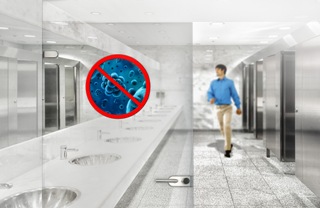Jan 22 2015
Researchers at the INM have now produced antimicrobial abrasion-resistant coatings with both silver and copper colloids with a long-term effect that kill germs reliably and at the same time prevent germs becoming established. The coatings are particularly suitable for the application on large and solid surfaces, on doorhandles and for textiles.

Hygienic conditions and sterile procedures are particularly important in hospitals, kitchens and sanitary facilities, air conditioning and ventilation systems, in food preparation and in the manufacture of packaging material. In these areas, bacteria and fungi compromise the health of both consumers and patients. Researchers at the INM – Leibniz Institute for New Materials have now produced antimicrobial abrasion-resistant coatings with both silver and copper colloids with a long-term effect that kill germs reliably and at the same time prevent germs becoming established. The coatings are particularly suitable for the application on large and solid surfaces, on doorhandles and for textiles.
The researchers from the INM will be presenting their results at the International Nanotechnology Exhibition and Conference nano tech 2015, Tokio, Japan.
“The new development combines two properties which means the presence of germs and fungi on these surfaces is zero”, explains Carsten Becker-Willinger, Head of the Nanomers Program Division. Silver or copper colloids which gradually release germicidal metal ions into the environment are incorporated in the coating. “The metal colloids are only a few nanometers in size, but their particular ratio of size to surface area produces a distinctive long-term effect. The “consumption” of metals to metal ions is then so low that the coating can be effective for several years”, says the chemist. The long-term effect will also be increased by the high abrasion resistance. At the same time, the surface of the coating is anti-adhesive, so neither dead nor fresh germs can adhere to the surface. As a result, the coating primarily counteracts the formation of an extensive biofilm.
The researchers were able to prove the double microbicidal and biofilm-inhibiting action using the standardised ASTM E2 180 test process. The new material can be applied to a variety of substrates such as plastic, ceramic or metal using conventional techniques such as spraying or dipping, and cures thermally or photochemically. Selective variation of the individual components allows the developers to react to the particular and different needs of potential users.
From January 28 to 30, the researchers of the INM present this and further results at the German Pavilion, Bootj 5J-21. At the German Pavilion, the Association of German Engineers (VDI) will concentrate the expertise of all German exhibitors at the nano tech. The German Pavilion is supported by the Federal Ministry for Economic Affairs and Energy (BMWi). An oral presentation on „Materials and Processing for functionalized Surfaces“. will take place at the Main Theater, Hall 5, on January 29, German Day.
INM conducts research and development to create new materials – for today, tomorrow and beyond. Chemists, physicists, biologists, materials scientists and engineers team up to focus on these essential questions: Which material properties are new, how can they be investigated and how can they be tailored for industrial applications in the future? Four research thrusts determine the current developments at INM: New materials for energy application, new concepts for medical surfaces, new surface materials for tribological applications and nano safety and nano bio. Research at INM is performed in three fields: Nanocomposite Technology, Interface Materials, and Bio Interfaces.
Source: http://www.inm-gmbh.de/